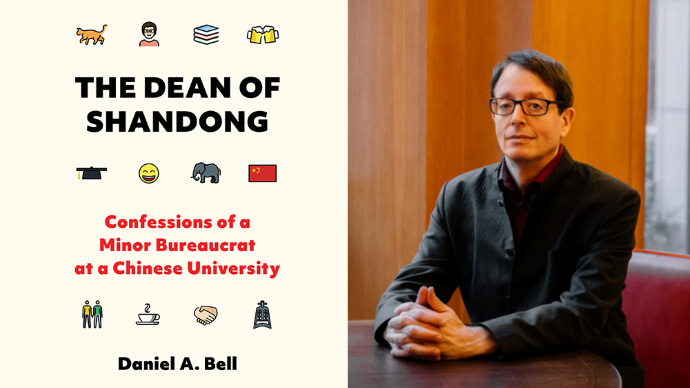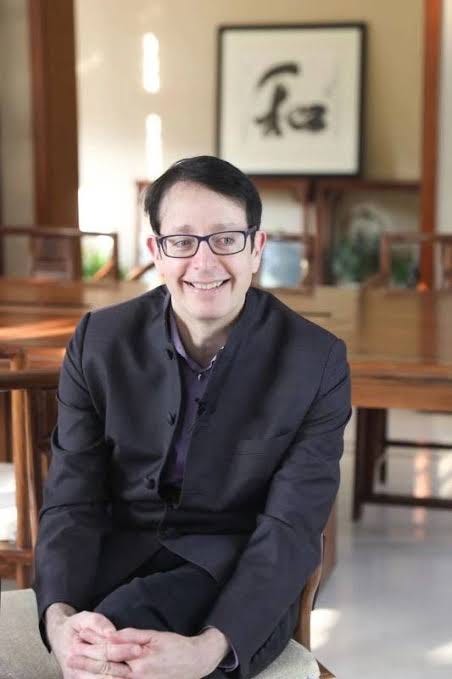Dean of Shandong: Confessions of a Minor Bureaucrat at a Chinese University by Daniel A. Bell
Daniel A. Bell (貝淡寧/贝淡宁)
These days, he is professor and chair of political theory with the Faculty of Law at the University of Hong Kong. But back when I knew him, he was still a political philosophy professor at Tsinghua University in Beijing. When I first stumbled on his work, I thought he was a genius, for Bell has that rare ability of being able to gain a clear distance from his preconceived notions —perhaps the most important attribute in a philosopher. I also thought his creativity was off-scale.
You can fight with me all you want, but Bell writes beautifully— like a novelist at times. From creating Socratic dialogues to academic essays that blur personal memoir with theory, he is always doing something new.
A Canadian by birth, he was raised in a Catholic and Jewish household and has spent nearly his entire professional career in Asia: Singapore, Hong Kong, mainland China, and now Hong Kong again. In addition to his scholarly books and journal articles, he also writes for places like the Guardian and is—yes, a public intellectual. I have been a fan for years.
But I suppose I wasn’t paying careful enough attention since out of nowhere, it seemed, he became a dean (!!) of Shandong University. And as the Princeton University Press website says, as the first non-Chinese person to become dean of a major Chinese university, he has a unique story to tell. He says he wants to de-demonize China…. and after watching the Republican Convention, I would say, someone really does need to do that! The number of times someone on stage disparaged China was astonishing. Embarrassing. But it is an old story. Back in the 90s, during the Bubble Years in Japan, when America felt itself economically threatened and on the run, there was a similar barrage toward Japan. And anyone who said that we could learn a thing or two from the Japanese was labelled a shill. Now that Japan’s economy is no longer a threat, we are not reading about the Japan invasion any more but I have vivid memories of the days when we did. And now it is China.
As Bell says, yes China has problems. But doesn’t the US also have problems? To praise things about China is not saying it’s a perfect system. But they do, he says, get many things right. Bell is correct, I think, that we compare problems with China to ideals in the US. Corruption in China with “democracy” in the US. I think many Americans would be surprised, for example, that not all citizens of the world aim to live in the US or to work to have their country become like us (I am writing this now from a fentanyl ravaged city in the United States with rampant crime).
From a review by Saralee Turner in iAffairs Canada:
“This is the nature of demonization. It is assumed that the one or the group being demonized must prove a negative, that he/she/they are not demon(s) and even when the evidence is fictitious or presented wrongly, the onus is on the demonized to correct the wrong impression and in many cases, without the megaphone the media provided in the first place.”
It was interesting to read about how decisions are made in Chinese universities. Whereas in the US so much attention and focus is turned to fund-raising and managing endowments, there wasn’t a word about that in this book. Decisions are consensus style with an aim toward harmony. Bell does a wonderful job explaining the meaning of harmony in China (my son’t first name also utilizes this character 和). Harmony is a balance between differing opinions, not the smothering of differences, which is how it is understood in Japan too. Harmony allows for differing voices as long as the common good takes precedence. This idea of the common good is something shared in both communist philosophies and Confucianism. And it is something deeply held in Japan. Communitarianism is also what Bell focused on for his PhD thesis at Oxford.
The title, the Dean of Shandong recalls Myself a Mandarin in its playful and self-deprecating style, which is continued throughout this really enjoyable book. From why hair-dye is a matter of course in China among male politicians, to things like emojis in academic communication and drinking culture in Shandong, Bell is endlessly fascinating.
About the hair dye, there was a strange sentence that I read in the book, that I might have imagined reading since I was very sleepy when I read it but it was something to the effect that if he hadn’t started dying his hair, he wouldn’t have started looking younger, and if he hadn’t started looking younger then he might not have been as attractive to ladies, and if that hadn’t happened….. well…. you can almost imagine the rest! Then he wouldn’t have gotten into trouble ending his marriage and then becoming the Dean of Shandong.
Did I read that right? Well, I copied it down to be used for my next story!
Oh, and I love the book cover!
++
I wrote this essay about a more academic book, Just Hierarchies: Why Social Hierarchies Matter in China and the Rest of the World, in the New Rambler. It was translated into Chinese here But I think this was one of my favorites of his work.
An essay I wrote, Tokyo: city of fires and flowers, which was part of Daniel Bell and Avner de-Shalit’s Rethinking City and Identity 反思城市与身份认同 project at Shanghai Jiao Tong University Shanghai, 16-18 May 2012 was published in the Critical Review of International Social and Political Philosophy.






Love this: Harmony is a balance between differing opinions, not the smothering of differences.
Fascinating man. The hair dye reminds me of a tai chi teacher. Chinese, I forget where he was from. In his fifties when I studied with him, the class was dumbfounded when he went back for a visit to china, only to return with his hair dyed. Everyone was so shocked! Thinking that his pursuit of a "natural" practice meant he would be a purist in aging with his grey hair. I remember we all caught glances of him out of the corner of our eye while doing the postures. As if he would somehow wave his arms and legs to emerge into some other form of matter. Didn't want to miss the next act! Lol!